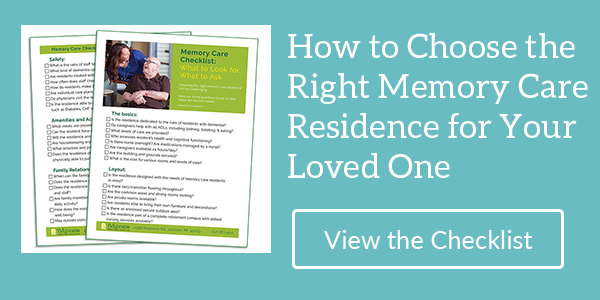Alzheimer’s Disease and dementia are common occurrences among aging adults – but that doesn’t make dealing with them any easier. Having a loved one fall victim to these cognitive issues can be painful, saddening and frustrating to say the least. And while there’s currently no cure for either condition, there are ways you can lessen their impact – both for you and the person suffering.
Do you have a parent, friend, spouse or other loved one dealing with Alzheimer’s, dementia or other forms of cognitive decline? Here are some tips for managing the situation.

Helping Your Loved One Through Alzheimer’s or Dementia
It’s important to understand that Alzheimer’s and dementia don’t just mean memory loss. They also come with a host of other cognitive challenges and issues for those who suffer from these conditions, and dealing with them can be very challenging and confusing as the disease worsens.
To help your loved one cope with the changes that are occurring or are on the horizon, you’ll want to:
- Engage them – It may be frustrating to repeat things or have the same conversations over and over, but continue to engage your loved one even as their conditions worsen. You should also help them participate in mentally stimulating activities and ensure they keep socializing. These can all slow the development of the disease and help them keep their cognitive abilities longer.
- Minimize stress and confusion – Try not to put your loved one in any situations that may stress them, confuse them or make them nervous. Stick to familiar activities they know and enjoy, and try to steer clear of anything that might overwhelm them.
- Help them stay independent – Whenever possible, give your loved one a little independence. Is it their granddaughter’s birthday? Bring them a card and let them write the note and put the stamp on. Are you going out to lunch? Let your mom put on her makeup and do her hair herself. When it comes to tasks they are still capable of managing themselves, empower them and let them take the wheel.
- Empathize – Always remember that as hard as the condition may be on you, it’s 10 times harder on your loved one. At any given time, they are confused, frustrated, angry and unsure all at the same time, and they don’t understand what’s happening to them (or why it’s occurring in the first place.) Try to empathize with the big changes your loved one is going through, and be there to answer questions, support them and help them in any way possible.
Finally, simply help them live well. Take them on walks with the grandkids to keep them active, prepare weekly meals to keep them eating healthy, and organize their pills and medications to ensure they’re getting the medical treatment they need. With your support, they can have a long, happy life no matter what conditions they may face. If you would like more details to help with the decisions involved in caring with someone with memory loss, check out our blog post, “Memory Loss and Memory Care Guide.”

Managing & Minimizing Wandering
Alzheimer’s and dementia sufferers tend to wander as their conditions worsen. They start leaving their house, disappearing without telling loved ones where they’re going or even driving aimlessly and far from home.
If you know someone in your life is dealing with cognitive decline, it’s important to take steps to minimize wandering early on in the process. You should:
- Safeguard the home. Add multiple locks and deadbolts to the door, so it’s more difficult to get out of the home unless they’re really determined to. Add alarms to windows and doors, and sync them with a phone app so that you can set and monitor them remotely.
- Minimize chances for wandering. Stick to outings at places your loved one knows and is familiar with, and try to avoid spots with big crowds where it might be harder to find your loved one should they wander. You should also consider taking an extra helper along on outings just itn
- Take a new photo of your loved one. It’s important to prepare for the worst when dealing with wandering. Use your phone to take a clear photo of your loved one from multiple angles, and email yourself important physical details like their height, weight, hair color and other distinguishing features. Should they go missing, you want these photos and information on hand for speedy dispersal.
- Identify patterns and triggers. After any wandering episode, try to identify the trigger. Were they in a busy or new place? Were they looking for a past friend or loved one? Were they disoriented or confused? Make a list of common causes and times of day when wandering occurs so you can avoid these risks in the future.
- Hide the car keys. If your loved one is still driving, keep the car keys away and out of sight – especially if they’re living alone. Wandering on foot is one thing, but trying to hunt down a wandering senior in a vehicle is much more difficult and often requires police intervention.
In the end, as wandering episodes increase, the safest option for your loved one is an assisted living or memory care facility. These not only offer them a secure space with constant monitoring and supervision, but they also come with trained medical care and health professionals who can help lessen the impact of Alzheimer’s, dementia and other forms of cognitive decline. That means a higher quality of life and less stress for your loved one in the long run.
Want to learn more about how assisted living or memory care can help your friend or family member through this difficult time or if you have questions about short- or long-term care for a loved one with dementia, contact Brightside Assisted Living and Memory Care today or call Margaret Nagel at (517) 206-5000 or download our brochure to learn about our care levels, cost, and amenities.


